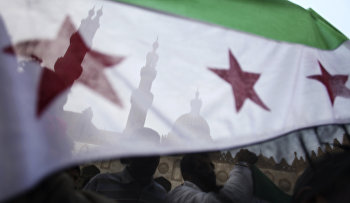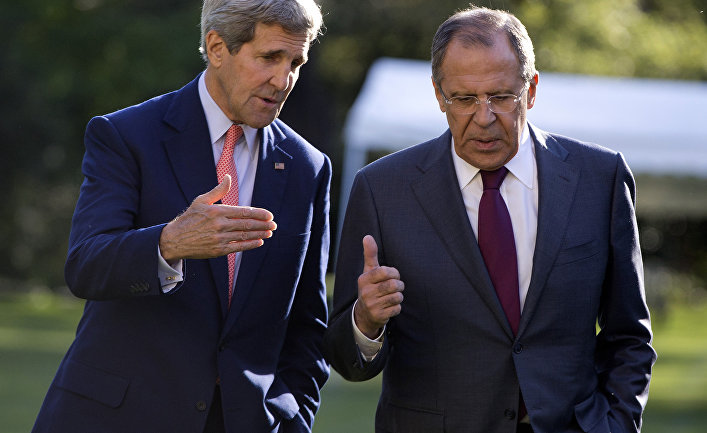The rules of the game for market players are simple – when everyone is selling, you should buy – and sell, when everyone else is buying. And most of all – never give in to the herd instinct, and keep looking ahead. This kind of market wisdom is worth heeding for Russian-American economic relations right now, too. The briefest look shows the furled brows. In politics it's the Cold War on re-run. In economics, everything's blighted by slump oil, the tumbling rouble, and instability all round. What more can be said?
Luckily, not everyone has lost their nerve. The latest edition of a joint project between Kommersant and The Washington Times (a project initiated by the Valdai Club international discussion forum, and now run by the Centre for National Interest in Washington) is dedicated to the prospects for economic collaboration. Neither of the authors is dressing-up cold reality – both of them see nuances amid the prevailing bleak situation. Yet their opinions converge on one point – no matter what happens today, there is huge potential, which won't be wasted – the grim picture will definitely give way to a better one. It's worth looking at a more realistic, and even optimistic scenario. We'll continue to seek that vital spark of that optimism in Russian-American relations in future.
Why are international corporations still looking for business in Russia? Newspaper comment and headlines have been gloom-laden for the past half-year, as Russia endures tumbling oil prices, Ukraine-prompted sanctions, and a sliding rouble. Over and above this, Russia has long had a reputation as a problematic location to do business. When answering this question we should remember why international companies decided to invest their own capital in Russia. Russia is rich in natural resources, not only oil and gas – there are many talented engineers, mathematicians and scientists. The Russian market, with its 140 million consumers, still needs development, and is one of Europe's largest in sectors such as mobile phones and cars. In the Bloomberg ratings for the innovation economy Russia is in twelfth place, while hitting the Top Ten for countries with their own high-tech companies – and the Top Five for highly-qualified working staff.

Russia's GDP more than doubled between 1998 and 2008, which the bulk of that growth being stimulated by consumer demand. Most international corporations went into the Russian market prior to 1998, and that investment took on a strategic and long-term nature. In the 1990s witnessed both great opportunities, and major problems – yet they remained convinced of the country's great potential. One example of this is Russia's role in the supply chain of goods between Europe and Asia. Many of the same international companies got into the Ukrainian market at the same period – because they saw a similarly rosy future there too.
The last eighteen months have been a serious problem for business in Russia. The figures say it for themselves. GDP fell by nearly 4% in 2015, the rouble lost 40% of its value, and year-on-year inflation rose by 13%. Direct foreign investment was cut back by two-thirds last year, while capital flight from Russia rose in 2015. International corporations took heed of these trends – with the hardest knocks taken by industries which depend on end-user demand. The ongoing falls in oil prices, and the devaluation of the rouble have mired economic forecasts for 2016. Even so, other economic indicators are showing that negative movement is gradually halting – we can see how the economy is adapting to lower oil prices. Both independent and government economists are foreseeing the onset of modest growth for 2017, even if oil prices fail to return to $40 per barrel.
Against the background of this difficult period for the economy we've seen numerous positive developments in Russian economic policy. The Russian Central Bank accepted the floating value of the rouble, and held off from plunging swathes of capital into its support. The Russian government continued to bolster its position. This year the World Bank put Russia at the top of its ratings for BRICS countries for business climate. Yet alongside this, some of Russia's anti-crisis measures have raised eyebrows – particularly their stress on import substitution, counter-sanctions against western food producers, and new restrictions limiting access to government tenders by foreign firms. As former WTO Director-General Pascal Lamy commented recently, these Russian import substitution policies are likely weaken local Russian producers, and lead to poorer-quality higher-priced products in Russian shops, due to an absence of competing high-quality goods from abroad.
Even so, there are no answers to the biggest challenges facing the Russian economy – what can be done to raise sustainable economic growth to around 4-5% annually, the growth level needed to put Russia on its own feet? Or to put it a different way, what is needed to attract new investment, support talent, and promote the rise of a new Russian middle class?
Should the role of the State in the economy be reduced? Will the authorities boost the rule of law, and protect property rights? There are serious concerns about these questions, but their answers lie in the hands of Russians themselves. There is value in looking at the prevailing difficulties in context. Sanctions certainly threw a major spoke into the wheel of the Russian economy – particularly with regard to gaining access to foreign capital – but it's been the fall in oil prices that's done the serious damage. A shift to a floating value for the rouble helped to soften the blow. Moreover, the slowdown in the Russian economy actually began early than 2014. GDP growth dropped from 4.5% in 2011 to just 1.3% in 2013 – even though oil prices were soaring above $100 dollars per barrel. The causes lie in Russia's unbalanced economy and structural disproportions. The period of global growth in the prices of raw materials, which began 15 years ago, is clearly at an end – the chances of seeing oil at $100 per barrel again are slim. This all means that structural reforms to Russia's economy are the key to any hope of renewing economic growth.

The route to expansion of the Russian economy prompts fierce discussion today. Russian Prime-Minister Dmitry Medvedev laid out his ideas in an article published late last year, firmly outlining the need for raising competitiveness, developing human capital, support for small business, and more energetic efforts to attract foreign capital and technology. The international business community would welcome such initiatives, along with other efforts towards structural reform within Russia. These ought to include the continuation of privatization plans, strengthened rights for the protection of property, and pensions reform.
Some comfort can be obtained from the fact that the Russian government is open to discussion of cutting red tape and regulatory burdens on business, through the Consultative Committee on Foreign Investment, and other such bodies. The American-Russian Business Council is working on many of these issues with Russian business associations who think along similar lines to ours. These include “Delovaya Rossiya” (“Business Russia”), the Russian Union of Industrialists and Entrepreneurs, and the American Chamber of Commerce (AmCham) in Russia – with whom we are working on solving common issues in the business sphere. During a time of heightened political tensions, dialogue between business groups in our two countries is especially valuable, to keep the communications channels between Russians and Americans open.
Gilbert Doctorow: Russia's Had Enough: No More 'Business as Usual' With US https://t.co/7DBnPftcUR pic.twitter.com/UONjUgUf4a
— Russia Insider (@RussiaInsider) January 30, 2016
Meanwhile, world business is continuing its sanctions regime against Russia at full pelt, over Russia's position on the Ukrainian conflict, as well as Russia's laws and regulations. The business community puts a high value on the US Government's readiness to discuss business fears about its sanctions regime, and the way it is being ratcheted up in chorus with the European Union's sanction program. Keeping a level playing field for American access to Russian markets, in comparison with our European and Asian counterparts, is our main concern.

The blunt facts are that the Russian economy of high risks and high returns, which we remember from the early 2000s is in terminal decline, prompted by external pressure. This economic meltdown is now the long-term scenario, while return to growth depends on whether the Russian government choose the right policies. Even though international companies are taking a realistic approach to the catastrophic outlook, American companies – members of AmCham – are remaining loyal to their Russian partners, clients and staff during this difficult downturn. The reasons are simple – the main attractions which brought these companies into the Russian market in the first place haven't changed. Russia has all the natural and human resources to be competitive in world markets – and international business can offer the capital, technology and ability to manage projects that will enable Russia to realize its potential to the full. In addition to this, having world-class companies in the Russian market helps to promote adherence to legal norms and international standards, compliance with equality in employment, principles of environmental protection, and other tried and tested approaches to doing good business. Wrecking business relations wouldn't be in either Russia's or America's interests.
Without downplaying the real and serious challenges which Russia is facing today, it seems a fair assessment to me that a flourishing, modern and competitive market in Russia would be in the interests of Russians and American – and could be a more stable basis for sustainable relations between America and Russia. It would also help in strengthening international relations overall, as well as smoothing the political and economic path in the turbulent world in which we all live.






